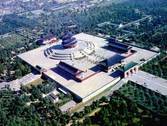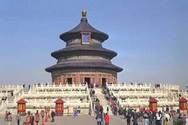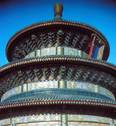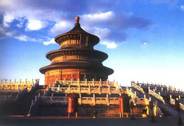On the east side of the front gate in the southern part of the city, there is the largest and most famous temple in Beijing, the Temple of Heaven, where emperors came to pray to heaven for good harvests on the 15th day of the first lunar month every year. Qiniandian is the main building in this temple. In Chinese culture, the name of the building means Hall of Prayer for Good Harvests. In the Temple of Heaven, especially Qiniandian, symbolism and metaphor are widely used to play up the theme. Its wonderful appearance, important roles in Chinese history and deep connotations from Chinese culture make it a masterwork of ancient Chinese architecture.
 |  |
 |  |
The surroundings of Qiniandian make it look more magnificent, because the Temple of Heaven uses ecological artistic techniques to give prominence to the theme of "heaven". The density of structures in this temple is very low, covered by large tracts of pine and cypress trees, creating a strong atmosphere of solemnity and nobility. Around Qiniandian, there is a large rectangular courtyard. The rectangle symbolises the earth. The ground level of the courtyard is much higher than the region outside it and the walls of the courtyard are lower than the height of a person. Standing in the courtyard, you can see the tops of the pine and cypress trees. The top of the low walls is covered by the green glazed tiles, the colour of which symbolises the earth and seems to merge with the green trees. These come together to give you the impression that the Hall of Prayer for Good Harvests stands above the earth. The hall itself is 32 meters in height and 30 meters in diameter. Although it is not a huge edifice, the empty large courtyard makes it look very grand. On each side of the hall there stands one row of small halls where the gods of secondary significance were honoured. They are the Gods of the Sun, the Moon and the Stars along with those of Rain, Thunder, and Lightning. The small halls and their Gods serve as a foil to the main hall and the main god—the great God of Heaven.
This majestic hall looks as if it were a colossus that could prop up the sky from the ground with the connection of the earth and the sky as the architectural scheme. Its circular plan symbolises heaven. The three-tiered marble terrace on which the hall stands represents the earth. The terrace is a six meters high and occupies more than 5900 square meters in area. Produced in Beijing, the marble is of a high quality crystal white type named Hanbaiyu. The Hanbaiyu banisters look like clouds between the earth and the sky. The triple-eaved roof of dark blue glazed tiles symbolises the sky and seems to merge with the blue sky. The eaves are smaller and smaller and finally the pinnacle disappears into the sky. The total height of the hall and the round white stone terrace is 38 meters. All of these are designed to create imagery of the close relation ship between man and heaven.
The transcendence and refinement of the structure and the details of Qiniandian make it more brilliant. The timber-structured hall looks both august and splendid. But the interior framework is by far the more distinctive. The construction of this hall was a great challenge because of its round plan. However, there are no beams, no crossbeams and no nails in this hall. The vault is solely supported by three circles of 28 massive wooden pillars and a number of bars, lathes, joints and rafters, which are integrated into a reinforced frame to keep up the bulk of the hall. The 28 pillars are symbolic of the 28 constellations. The four larger central columns represent the seasons, the middle twelve represent the months and the outer twelve with the middle twelve represent the 24 divisions of the traditional Chinese day. The four pillars in the centre, called the "Dragon Well Pillars", are 18.5 meters high and 1.2 meters in diameter. All of the wooden structural components are covered with beautiful painting to protect them. The painting style of golden dragons on a green and blue background is of the highest grade in China for painting on the most important architecture. For this building, the painting not only shows venerability of the hall, but makes it more like a part of the sky.
Qiniandian is the heart of the Temple of Heaven, whose name can be found in the list of World Cultural Heritage Sites of UNESCO. It is not only the magnum opus of ancient Chinese architectural history because of its elegant appearance, but also because it is evidence of the respect for and belief in Heaven and the gods in traditional Chinese culture. The Hall of Prayer for Good Harvest is a great being with a noble-minded soul rather than a just building.
* * *
You are welcome to print and circulate all articles published on Clearharmony and their content, but please quote the source.










 more ...
more ...